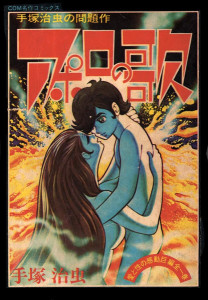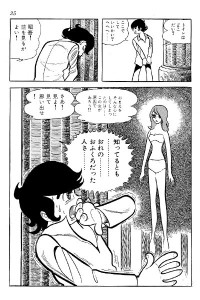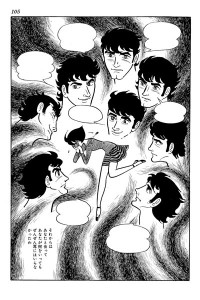Apollo’s Song (Manga)
Also known as アポロの歌 (Aporo no Uta)
| English Title: | Apollo’s Song |
| In English? | Yes |
| Japanese Title: | アポロの歌 Aporo no Uta |
| Type: | Ongoing Serial |
| Original run: | 1970/04 – 1970/11 |
| Published in: | Weekly Shonen King 週刊少年キング |
| Published by: | Shonen Gahosha |
| Volumes: | 3 MT-035 | MT-036 | MT-037 |
Originally published in Weekly Shonen King from April to November 1970, Apollo’s Song (1970) is, in effect, a microcosm of Tezuka’s work that combines nearly all his signature styles and techniques in one mature story.
What it’s about
Apollo’s Song (1970) follows the story of Shogo Chikaishi, a young boy living with his indifferent single mother. Born after his mother had a series of affairs with a variety of nameless men, Shogo, grows up lonely, bitter and angry. Never having felt love from his own mother, seeing various animals caring for their offspring enrages Shogo and he kills them. When he eventually sneaks onto a farm and kills a chicken, Shogo is arrested and sent to a mental institute.
At the institute, Doctor Enoki attempts to use electro-shock therapy to try and clear Shogo’s mind and stop his violent behavior. Instead, the shock gives Shogo an out-of-body experience where he visits a temple and meets the Greek goddess of wisdom, Athena. After subjecting him to a series of trials, she sentences Shogo to a cycle of death and rebirth where he experiences love and loss over and over again, in different time periods and situations, until he is finally able to understand the true meaning of love.
What you should know
In many ways, Apollo’s Song (1970) is an ideal primer for Tezuka’s works. The story follows a single pair of characters through multiple lives, each subsection gives a sample of a different one of Tezuka’s favorite genres, including medical drama, crime/thriller, war drama and science-fiction.
In this way, it touches on many of Tezuka’s favorite themes, including: reincarnation, the cycle of life and death, karma, the devastation of war, the conflict between nature and civilization, and the question of whether different intelligent races can ever coexist in peace – all organized around a core romantic story. It also demonstrates how Teuzka likes to thread multiple narratives together to form a larger story. As such, Apollo’s Song (1970) acts as a nice introduction to the way the Star System works without the need for prior knowledge of Tezuka’s cast, with Shogo being basically cast as the same ‘actor’ in multiple ‘lives’ or ‘roles’.
In the late 1960’s children’s sex education was a heated topic of discussion in Japan. Despite the misgivings of many adults, this led to more provocative material being published in manga aimed at children, which, in turn, began to start drawing an audience of university and high school students. According to Tezuka, in the afterword to the Osamu Tezuka Complete Manga Works edition (MT-037):
“Apollo’s Song presented an opportunity to produce that kind of ‘youthful’ manga. However, amongst the university student body, student activists began to incite riots and other violent incidents. As such, ‘youthfulness’ as a whole began to grow darker because of the actions of violent and bloodthirsty student radicals. Of course this strongly influenced my manga, and led me to introduce many strong elements into my story” (1977, p. 208).
Sharp-eyed fans of Tezuka’s Star System will recognize Hiromi Watari as the adult form of Tezuka’s magical girl, Melmo. As the star of Marvelous Melmo (1971-72), Melmo is a child with a jar of magic pills which let her instantly adjust her physical (but not mental) age. Transforming physically into a mature woman let’s Melmo have adventures that explore various elements of adult life, including different careers, romance and sexuality, through the eyes of a child. Another aspect of Tezuka’s response to the question of children’s sex-education, Marvelous Melmo (1971-72) was partly intended to teach young girls about adult issues, like menstruation and the dangers of sexual harassment, while it entertained. This message is echoed, albeit for a different audience in her role in Apollo’s Song (1970) as Melmo educates the love-starved Shogo about many kinds of love, as well as the eternal natural instinct to reproduce.
Where you can get it
Luckily, for English-speaking fans, Apollo’s Song (1970) was published as a single-volume trade paperback by Vertical Inc. in 2007. In 2010, Vertical Inc. re-published Apollo’s Song (1970) in two separate volumes.






